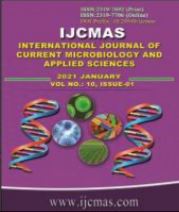


 National Academy of Agricultural Sciences (NAAS)
National Academy of Agricultural Sciences (NAAS)

|
PRINT ISSN : 2319-7692
Online ISSN : 2319-7706 Issues : 12 per year Publisher : Excellent Publishers Email : editorijcmas@gmail.com / submit@ijcmas.com Editor-in-chief: Dr.M.Prakash Index Copernicus ICV 2018: 95.39 NAAS RATING 2020: 5.38 |
In order to screen maize genotypes for resistance to post-flowering stalk rot (PFSR) complex caused by Macrophomina phaseolina under field conditions, toothpick method was used for creating artificial epiphytotics. In this study, 98 maize genotypes (20 parents (15 Lines × 5 testers), 75 Single Cross Hybrids (SCHs) and three standard checks) were screened in field by toothpick method of inoculation. The field screening of maize genotypes by the standard toothpick method which needs about 40 days (only at harvesting stage) for expression of plant drying symptoms due to PFSR and data are possible to record only at the time of crop harvesting. Screening is done by using 1-9 rating scale of PFSR for scoring disease severity in-vivo condition. All these maize inbred lines were screened in field by toothpick method of inoculation at Maize Research Centre, Agricultural Research Institute, Rajendranagar, Hyderabad. As a result, most of the genotypes were exhibited disease reaction varying from resistant (score-2) to moderately resistant (score-5) against M. phaseolina. In ordered to identified PFSR resistant lines, screening of 98 maize genotypes in field against M. phaseolina, only four lines, viz., MGC-237, MGC-248, MGC-254, MGC-256 and two testers, viz., BML-6 and GP-311. Whereas, 15 crosses viz., MGC-9 × BML-6, MGC-9 × BML-14, MGC-32 × BML-14, MGC-32 × GP-170, MGC-92 × GP-170, MGC-137 × GP-311, MGC-237 × BML-7, MGC-242 × BML-14, MGC-248 × GP-311, MGC-252 × BML-14, MGC-252 × GP-311, MGC-254 × BML-14, MGC-254 × GP-311, MGC-256 × GP-170 and MGC-256 × GP-311 were found resistant.
 |
 |
 |
 |
 |